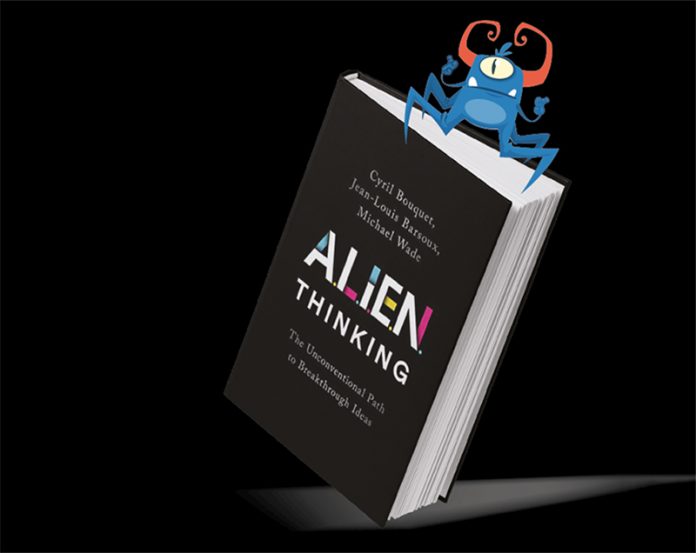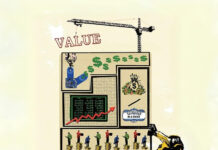By Kyle Scott
Innovation is the key to success and the essential ingredient for staying ahead of the competition. Unfortunately, modern life does not give us the time or space to be the innovators we need to be. ALIEN Thinking provides readers a template for how we can overcome these obstacles.
ALIEN Thinking: The Unconventional Path to Breakthrough Ideas by Cyril Bouquet, Jean-Louis Barsoux and Michael Wade, New York: Public Affairs, 2021.
Everyone has been told to “think outside the box.” Of course, the person using the phrase is themselves an “in the box thinker” otherwise they would not be using a tired cliché. While the juxtaposition is comical, the demand on workers to be creative and innovative is a real concern since these are not things one can do on command as one needs the right space, time, resources and skillset to do so. With limited time, and with attention being pulled in too many directions to maintain a line of thought for longer than a TikTok video, creativity and innovation can seem like stretch goals more than necessities. But to succeed in a competitive landscape, and to be able to pivot when the landscape changes, creativity is a necessity and those individuals and companies that cultivate it are best positioned to succeed.
Given this imperative, ALIEN Thinking: The Unconventional Path to Breakthrough Ideas by Cyril Bouquet, Jean-Louis Barsoux and Michael Wade, is essential reading for anyone looking to up their creativity game and take a lead in today’s business world. These three IMD professors are accomplished researchers, authors, teachers and consultants who combine an academic’s idealism with a practitioner’s realism. This book makes a compelling case for creativity while providing actionable insights of how to implement.
ALIEN is the acronym the authors use for Attention, Levitation, Imagination, Experimentation, and Navigation. In their words, ALIEN thinking is the “antidote to orthodoxy”. There is a chapter dedicated to each of these elements that contain anecdotes and case studies to illuminate the points and help the reader develop the skills and structure necessary to harness breakthrough thinking. This format makes the book accessible and the lessons easy to internalize. Each chapter also ends with a Key Takeaways section which is particularly helpful for later reference.
The most thought provoking, and timely, chapter is dedicated to Imagination. Imagination seems to be the linchpin holding all the other pieces together. Imagination is difficult since it requires us to break away from the algorithmic-defined information flow which insures we only consume content which is reflective of the previous content we’ve consumed. This almost guarantees that we are not exposed to new ideas or experiences that would inspire creativity. It’s a great way to sell us bedsheets and beer, but it impedes our exposure to new ideas which are the impetus of imagination. This process silos individuals since each of our feeds, search results, and recommendations are tailor-made for each one of us based upon what we’ve previously searched, watched or engaged with. This stifles imagination. This is a separate but related issue to the negative effect technology has on our ability to concentrate—an issue relevant to chapters 2 and 3.
Overcoming an environment that limits imagination, and in the authors’ argument sets up obstacles to ALIEN thinking more generally, requires establishing practices that counteract these negative effects and provide the space, opportunity, and resources to engage in the type of thinking and activity that will lead to breakthrough thoughts. In separate projects these authors have explored how organizations can transform their operations to better leverage a firm’s resources to deliver and extract value from customers. For instance, Wade has written extensively on digital transformations and how an agile, holistic approach can lead to better adaptability and execution. At its core, organizational agility both requires and enables ALIEN thinking. There is a synchronicity between gaining new insights, having an organization receptive to implementing strategies in accordance with new insights and the pillars of agile work such as a commitment to innovation with cross-functional, self-forming, autonomous teams. With so many companies favoring agile—if not the methodology proper—it makes perfect sense for ALIEN Thinking to become essential reading for executives, managers and front line workers who need to understand why agile works and what conditions need to be nurtured and cultivated to make it happen.
Organizations are also moving away from traditional strategic planning to scenario planning. Strategic planning is a static process that assumes one can look into the future and assign probabilities to expected futures. Resources are then allocated according to those probabilities. This is how traditional short term and long-term planning is done. The problem with this approach is we’re not good at predicting the future. ALIEN Thinking contains great examples of companies that had bet wrong on the future and were unable to adjust when they realized their error. Strategic thinking requires an allocation of resources that is hard—if not impossible—to reverse. Scenario planning, on the other hand, assumes we cannot know the future and rather than taking a probabilistic approach it looks to what’s possible. Because what’s possible cannot always be predicted, organizations who engage in scenario planning must be agile as they recognize the need to adapt to unknowable and changing circumstances. We can see the benefits of scenario planning if we look at the past eighteen months. It is those organizations who were adaptable and open to innovation that have succeeded in a rapidly changing and unpredictable environment. In short: Those organizations who had ALIENs were best equipped to seize on the opportunities the pandemic offered.
What this book demonstrates is that regardless of what methodology or management technique is implemented, the mindset is what matters. A closed and rigid mindset will block anything from a system that is supposed to be innovative. Likewise, a bureaucratic system can be circumvented by ALIENs. The book provides terrific examples of how to become an ALIEN and how to take small, practical measures to help us move in that direction. But, without the desire to be different and think differently, we won’t take that first step to becoming transformational thinkers.
This is not to say having a game plan for implementation is unimportant. The authors dedicate time to discussing the importance of execution and best practices for doing so. Chapter 6 focuses on Navigation—the N in ALIEN—and exemplifies how practitioner-oriented these authors are. It’s not enough to have a great idea; you need to implement and follow through. The authors dedicate this Navigation chapter to helping the reader learn to navigate corporate structures, investor meetings, and other potential roadblocks so their idea can progress. This is where most books gloss over operational realities and where this book gives the reader what they need to succeed.
If I have one qualm with this book it was a missed opportunity to bring up the ethics of creating the opportunity for creativity. Those who succeed are ALIEN thinkers which requires space, time and resources. Those who have successfully secured resources can further engage in ALIEN thinking more easily which keeps them at the top of the hierarchy. For instance, a frontline warehouse worker who is compensated and retained based upon hourly productivity has less time to dedicate to exploring new opportunities than the CEO who has a personal driver, private plane and spends down time in Aspen and Davos at thought leadership conferences. Assume now the warehouse worker is a single parent with dependent elderly parents and the opportunity to succeed—which is predicated on one’s ability to think and act on new and innovative ideas—is even more limited. Of course, there are exceptions and this book does a wonderful job highlighting ALIEN thinkers who are not among the most privileged. Because a few have overcome doesn’t mean there isn’t an ethical issue that needs to be addressed. Equitable opportunity to the resources—primarily space and time—that will allow the ambitious but underprivileged to engage in the sort of thinking that leads to innovations should be a priority for policymakers and companies.
No book can do everything and perhaps this is an opportunity for a follow up project. So aside from this minor qualm, ALIEN Thinking has the potential to reshape how we think about innovation from an individual and organizational level—namely, that it’s possible with the right plan in place. There are practical and impactful lessons for the reader who chooses to engage. This book serves as a needed companion to the current selection of titles that focus on the ills of the modern workplace and a society defined by its distractions. Those books miss the opportunity to offer practical, corrective action; ALIEN Thinking fills that void. ALIEN Thinking is also the perfect companion to management books on agile, scrum, and scenario planning as it gives individuals the tools needed to fully leverage the power of those methodologies. Whereas those books usually focus on organizations and groups, this book adds individuals to the mix.
In a world that celebrates billionaires launching themselves into space, it may seem difficult for the average person to think of themselves as an innovator if that’s what it takes. ALIEN Thinking shows the reader how anyone—with the right structure and approach—can have breakthrough ideas and how to make those ideas more than just an idea.
About the Author

Kyle Scott, PhD, MBA has previously written for The European Business Review and other publications including Forbes, Christian Science Monitor, Huffington Post and dozens of other news outlets and trade publications. Kyle has authored five books with his sixth, Preparing for an unknown future, due out early next year.
- Email: kylescott@alumni.rice.edu
- Twitter: @kanthonyscott
- LinkedIn: https://www.linkedin.com/in/kyle-anthony-scott/



































